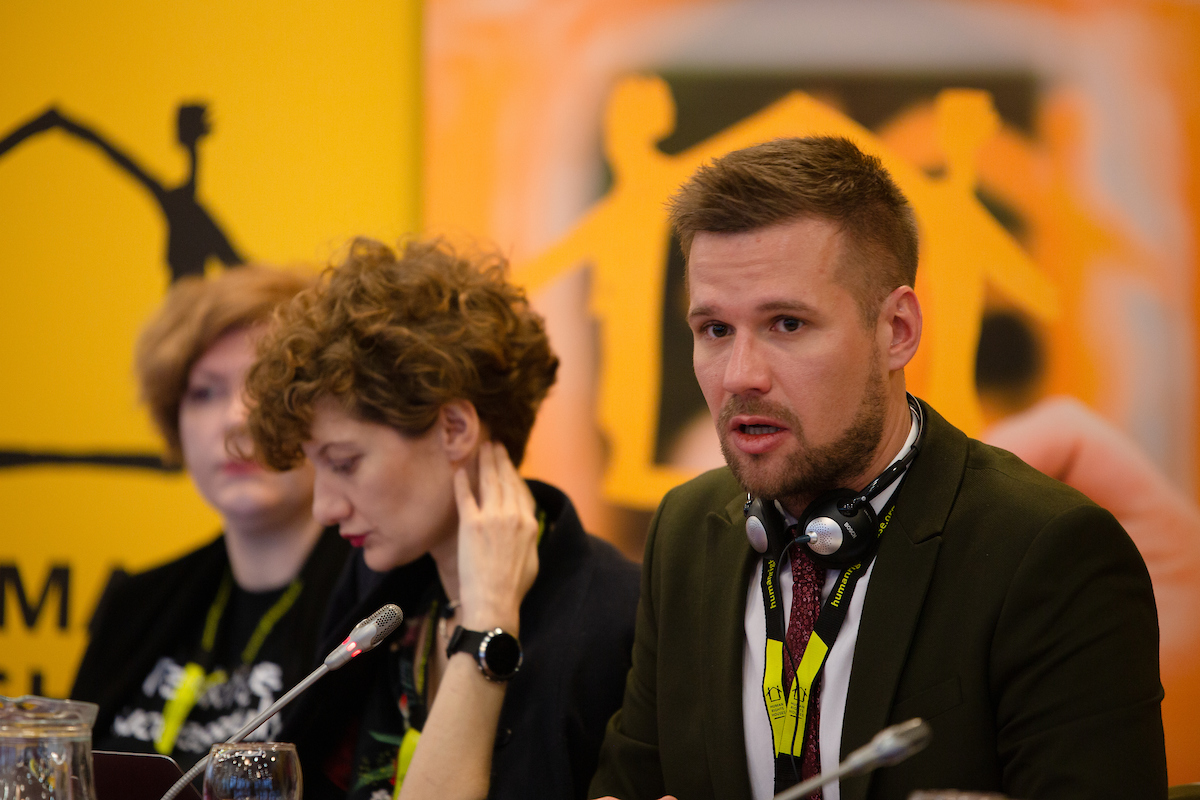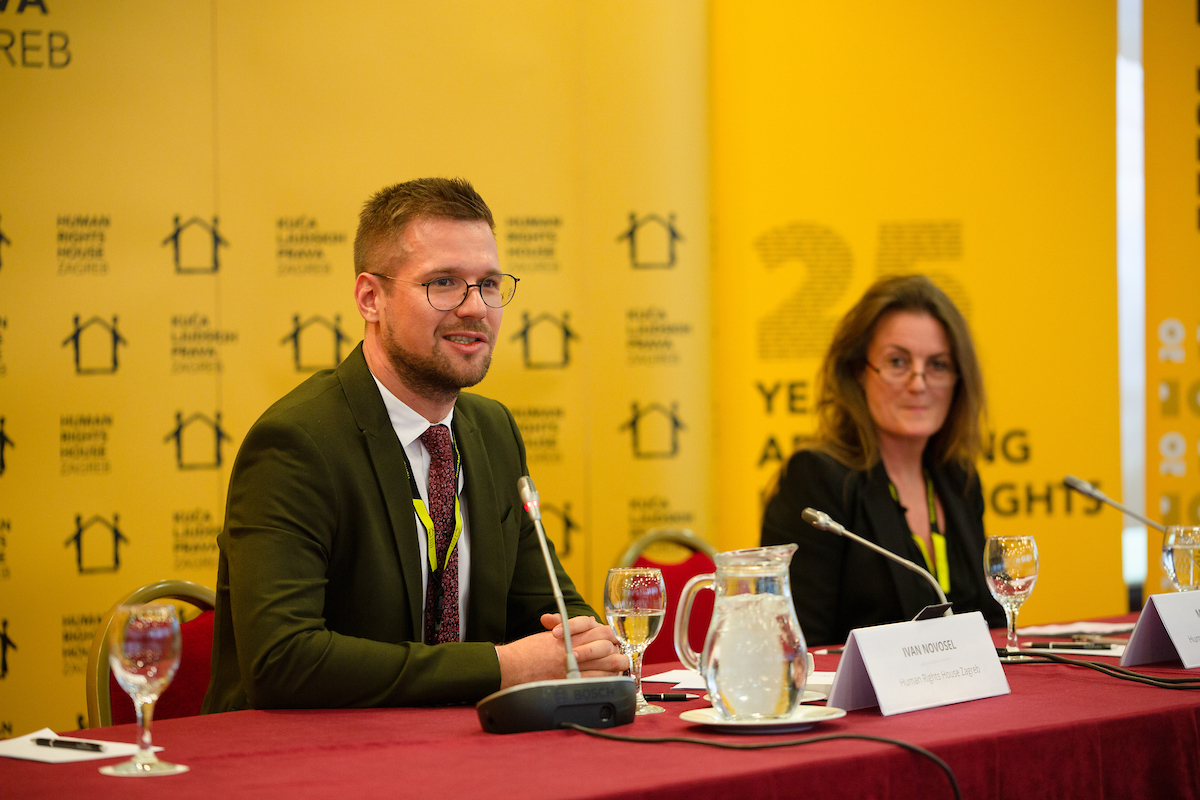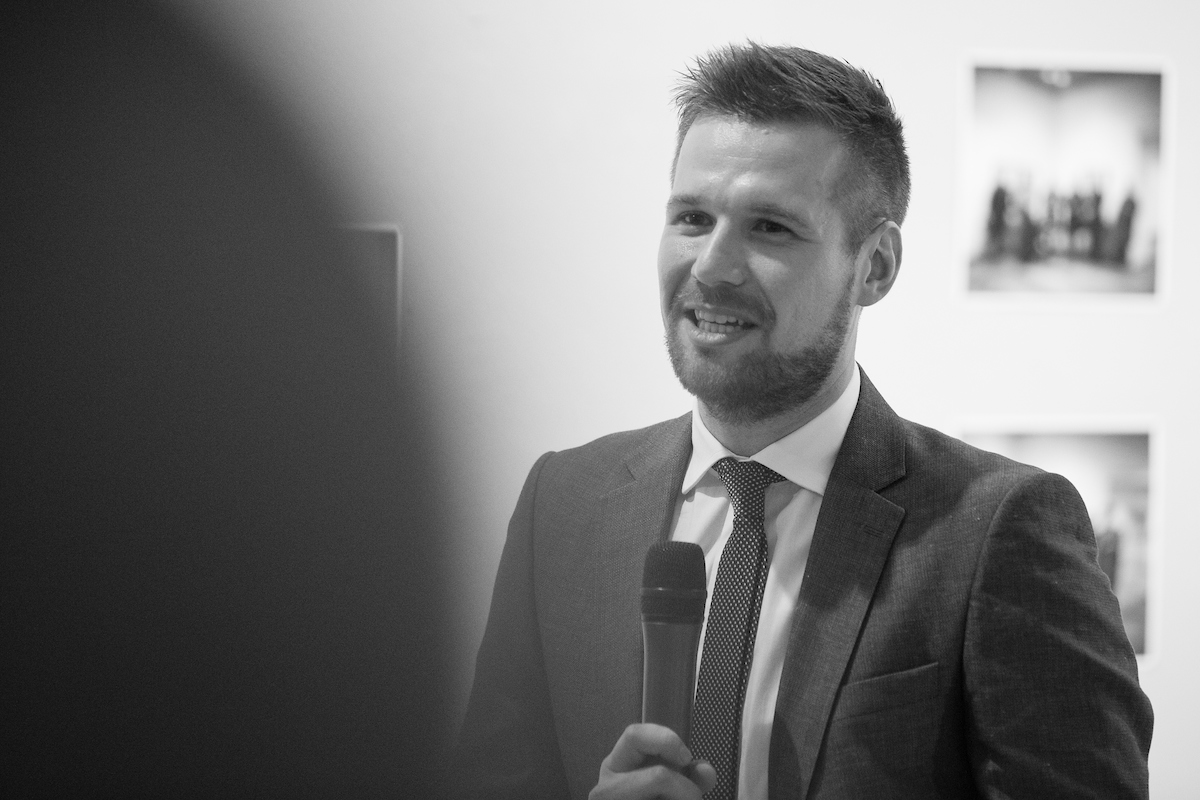Exercising of human rights during 2020 was primarily marked by restrictive measures adopted to protect public health and in response to the emergence and spread of the epidemic
Unfortunately, Croatia has a weak capacity to design and implement public policies in the field of human rights, which today is significantly smaller than it was more than seven years ago, before joining the EU in 2013, says Ivan Novosel, Director of Programs at Human Rights House Zagreb. In addition, since joining the EU in 2013, we have seen a decline in the quality of dialogue between public authorities and civil society organizations, Novosel believes.

-
According to the report on the condition of human rights in Croatia in 2020, which was recently presented, certain areas show stagnation and regression. What are these areas and what do you believe is the reason for this stagnation?
For years already, Human Rights House Zagreb has been publishing human rights reports which are made based on year-round monitoring and contributions from around 40 civil society organizations from Croatia. We try to make our reports comprehensive, and that’s why last year’s report analyzes more than 20 areas of human rights, from civil and political rights to the realization of social, economic and cultural rights.
Last year – in the world and in Croatia – was a year of crises and unprecedented restriction of human rights that democratic societies have not witnessed since the time of World War II. Restriction of movement, bans on public gatherings, shutdown of shops, restaurants and restrictions on social, economic and sports activities, mandatory self-isolation and isolation, wearing masks and minimizing social contacts and other restrictive measures have changed people’s daily lives and forced the society and the state to function in a crisis situation.
Exercising of human rights during 2020 was primarily marked by restrictive measures adopted to protect public health and in response to the emergence and spread of the epidemic. The epidemic and the earthquakes caused stagnation in most areas of human rights where progress was recorded in the previous years, and sadly, there was also a regression in the exercising of human rights in many areas of protection of the most vulnerable social groups and individuals.
Long-term negative trends in certain areas that we have recorded in the previous years have become even more pronounced under the influence of the epidemic and the aftermath of the earthquake – from protection from domestic violence, access to justice, freedom of the media to the right to health, home and adequate living conditions and the right to work.
Response to social issues that need to be addressed systematically, such as intolerance, hate speech, discrimination and violence, and hate-motivated violence, was superficial and reactive, often only after they escalate, failing to protect the most vulnerable members of the society. Children and young people are not learning enough about human rights, equality and solidarity, while distrust of public institutions is growing and opportunities for civic participation are weakening.

-
In addition to the pandemic, Croatia is facing the issue of earthquakes in Zagreb and in Banija. And that is one of the reasons for a certain degree of stagnation. How strongly did the earthquake affect the exercising of human rights in the rest of Croatia?
Last year, Croatia faced multiple crisis situations at the same time. The earthquakes in Zagreb and Banija caused great material damage, which still has not been repaired, especially in Banija, which is the first step. Renovation and construction, however, have not actually begun, at least not systematically. More than a year has passed since the Zagreb earthquake, and a significant number of citizens still live in temporary accommodation without a clear idea of when the reconstruction might end and when they can return to their own homes. There is no renovation of residential buildings in the center of Zagreb, but also other buildings in Čučerje and Markuševac at a systematic level and it seems that it will be long and slow. We have all witnessed media reports about the bureaucratization of the whole procedure and the amount of “paperwork” that needs to be produced in order to start the procedure of obtaining state aid for the renovation of buildings. How the entire renovation process will look like in Banija remains to be seen.
Effects of the earthquake on human rights will be felt for many years to come, especially when it comes to the human rights of the citizens of Banija who lived in one of the economically poorest and most deprived parts of Croatia even before the earthquake. It will take great efforts to restore this large area, as well as to revitalize it. Reconstruction, both material and social, needs to be based on the needs of citizens and communities, concern for the protection of the most vulnerable social groups and, in general, the raising of standards and access to social and economic rights.

-
To what extent do state institutions and decision-makers in general pay attention to the issue of human rights development and what kind of interlocutor are they in solving these problems?
Citizens’ trust in the institutions was low even before the crisis, primarily due to the weak responsiveness of state institutions, the slowness and rigidity of public administration and the judiciary, and the perception of corruption. Last year further exposed the state’s inadequate preparedness to function in crisis situations, from the lack of a predefined and clearly prescribed manner of limiting human rights in emergencies, to the poor level of preparedness of civil protection sector to deal with multiple crises. Consequences of the inadequate system were clearly visible in the example of the Civil Protection Headquarters of the Republic of Croatia, to which the initial strong support of the citizens began to wither as the confidence in the impartiality of their decisions decreased.
Unfortunately, Croatia has a weak capacity to design and implement public policies in the field of human rights, which today is significantly smaller than it was more than seven years ago, before joining the EU in 2013. For over five years, Croatia does not have a valid national policy for the protection and promotion of human rights, national policy for gender equality and a national strategy for the development of civil society. In addition to the lack of basic public policies in the field of human rights, unfortunately, the existing policy in the field of poverty alleviation is not based on human rights and as such is almost unusable for improving the socio-economic rights of citizens.
Since joining the EU in 2013, we have seen a decline in the quality of dialogue between public authorities and civil society organizations. Consultations on the drafting of new regulations and public policies are very often carried out pro forma without a genuine will and willingness to cooperate, including criticism, which would improve quality. This is one of the reasons why very often priorities and measures in public policies do not correspond to the real needs of citizens in the field. There is a great mistrust between public authorities and civil society, which is the cause of the decline in the quality of citizen participation in the work of various bodies, councils, committees and the like, who work in their own sectors to improve their area of interest. With some positive exceptions, it is actually very difficult to cooperate systematically with the state in the field of human rights. It is necessary for all stakeholders, on both sides, to start building trust, because only in this way will cooperation on solving the problems that citizens face in exercising human rights in Croatia be improved.
-
What are the most common issues and what are your suggestions on how to start solving them?
The quality of life in Croatia continues to be extremely negatively affected by the uneven quality of public services, regional inequalities in income, access to health care, education and social protection, and economic inequalities. Older people, single-member families and children are particularly at risk of poverty, and although this area should be a priority, Croatia welcomed the end of 2020 without a usable and human rights-based public policy to combat poverty for the future. Insufficient proactivity and weak capacity and efficiency of public administration for the development and implementation of human rights-based public policies remain of particular concern, leading to inconsistencies and inefficiencies in addressing the burning issues of citizens, especially in the area of social and economic rights.
These issues should be resolved systematically – by strengthening the public administration and by bringing solutions that are based on citizens’ needs and the highest standards of human rights protection. It’s necessary to strengthen independent institutions, cross-sectorial cooperation, dialogue with civil society, opportunities for citizen participation in the decision-making process. In addition, some complex solutions require large material investments, and even here we need to move towards efficient public administration, reducing bureaucratization. We need long-term measures to strengthen resilience to economic shocks, as well as better policies to exercise fundamental economic and social rights, such as better housing policies, employment policies in epidemic changing working conditions, and changes in the social welfare and health care system. It is especially important to respond to needs of the citizens in the earthquake-stricken Banija, which has been impoverished even before that. It is also a strategic issue and requires an urgent response and synergistic action from us all.
-
How much do you cooperate with your colleagues in the region and how would you assess the human rights situation in the environment? How similar the problems are, and where do they differ?
The Human Rights House Zagreb has a developed and very close cooperation with human rights organizations in the region, with which we have been working for years on resolving similar challenges and issues. Sadly, the human rights situation throughout the region has stagnated in recent years and is rapidly declining in some areas. This is evident primarily in the area of media freedom, rule of law, access to justice, and under the influence of the pandemic, stagnation is particularly visible in the area of socio-economic rights.
We are trying to share experiences with our colleagues regarding the accession to the EU, since a lot can be done in this process to improve the system of protection and promotion of human rights. This exchange is important, as we all have similar transition problems from the 90s, the legacy of the war and the like where colleagues can find the Croatian experience relevant to avoid some of our mistakes and create better solutions that will contribute to improving human rights in their countries and in the region as well.
-
What are your plans, projects, and what will the Human Rights House be working on in the coming period?
We at the Human Rights House continue to monitor the human rights situation in Croatia, and we expect the adoption of the National Plan for the Protection of Human Rights soon, the implementation of which we will also monitor. We also continue to monitor the implementation of judgments of the European Court of Human Rights and communication with the Committee of Ministers of the Council of Europe regarding the supervision of cases of human rights violations. We will work with our partner organizations in Croatia on monitoring socio-economic inequalities and the realization of economic and social rights, and we will also develop proposals for education, housing and labor policies based on international standards of economic and social rights. We continue to strengthen civil society and in the next three years we will work intensively on developing new ways of work and innovative models for institutional and legal advocacy, support to victims of human rights violations and public communication and mobilization of citizens. We continue to focus on freedom of expression, media freedom, suppression of hate speech and hate crimes, victims’ rights and procedural rights, and we will additionally dedicate ourselves to conducting education on human rights and systematically improving the quality of non-formal education, civic education and education for democratic citizenship.